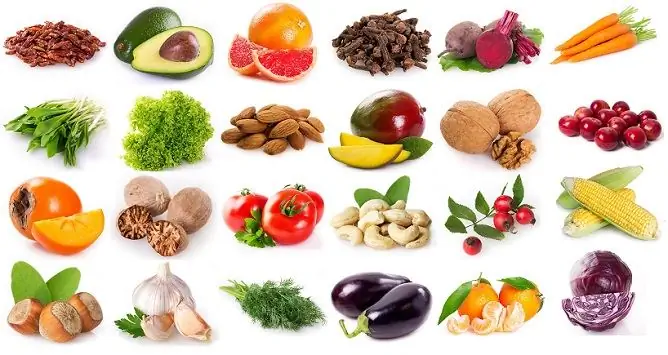- Author Rachel Wainwright wainwright@abchealthonline.com.
- Public 2023-12-15 07:39.
- Last modified 2025-11-02 20:14.
Male problems: 14 foods that lower testosterone production
Testosterone is a product of the adrenal cortex, in addition, in men it is produced by special cells located in the testes, and in women - in the ovaries. Yes, women also have a small amount of this hormone. The hormone takes an active part in the formation of male secondary sexual characteristics; its concentration determines the intensity of spermatogenesis and sexual behavior of the stronger sex. With insufficient testosterone production, the hormonal balance in a man's body shifts towards the prevalence of female sex hormones - estrogens (which are also present in men). As a result, libido decreases, female-type obesity occurs (fat deposits mainly on the abdomen and thighs), the mammary glands increase, and the hair on the face and body decreases.
Deficiency of testosterone in a man's body can be the result of both illness and dietary errors. We will tell our readers about products that sometimes cause male hormonal imbalance.
Salt
Table salt is the main source of sodium and chlorine. Both elements are necessary for the body to maintain water-salt balance. In addition, without a certain amount of sodium, normal functioning of the nervous system is impossible (it is involved in the transmission of nerve impulses). Its deficiency leads to a violation of the composition of the blood plasma. Chlorine is a part of bile, its lack makes it difficult for the liver.
The daily intake of salt for an adult is 10-15 g. Considering that almost all products that have undergone industrial processing (bakery and grocery products, sausages, meat and fish cooking, canned food, etc.) already contain salt, daily consumption this product in its pure form is advised to be reduced to 5-7 g. And lovers of salty are in danger of problems: it has been proven that an excess of sodium inhibits the production of testosterone.

Source: depositphotos.com
Sugar
There are many sweet teeth among the stronger sex. In part, the fact is that men often do hard physical work, they need glucose for quick recovery. However, this does not mean that the "fuel" needed by the body should be extracted from refined sugar. With each sugar intake, the blood glucose level rises sharply, and in order to compensate for the imbalance that has arisen, the body hastens to inject a portion of insulin into the bloodstream, which inhibits the process of testosterone production.
It is worth considering the fact that in the absence of heavy loads, the body does not have time to spend a significant part of the "fast" calories and transfers them to the reserve in the form of fat. With a low testosterone level, there is a high risk of fatty deposits, and fat itself contributes to the production of estrogens, which further knocks down hormones.
To avoid this kind of problem, you should limit your pure sugar intake to 6 tsp. a day, give up confectionery and sugary drinks, giving preference to natural sources of glucose - fruits, berries and honey.

Source: depositphotos.com
Coffee
Caffeine has the ability to bind testosterone, but that's not the main danger of drinking too much coffee. Together with caffeine (which, by the way, is quickly destroyed in the body), 19% of the components of the original product pass into the liquid when brewing natural ground coffee, many of which provoke the production of estrogen. When using instant coffee (even those varieties that are almost decaffeinated), the proportion of such substances increases to 45-50%. Therefore, in order to maintain normal sexual activity, a man must limit the consumption of natural coffee and completely abandon soluble drink options.

Source: depositphotos.com
Hormone-Grown Meat
It's no secret that in the industrial production of meat, the growth of farm animals and birds is spurred on with the help of female hormones. As a result, beef, pork and poultry sold through retail chains contain high doses of substances that are harmful to men's health.
You can avoid the negative consequences of consuming such products by reducing their proportion in the diet. It makes sense to enrich the menu with lamb, fish and rabbit dishes: hormones are almost never used in the production of these types of meat.

Source: depositphotos.com
Cholesterol-rich foods
Cholesterol has many important functions in the body, but very little is required. And the consumer of meat products receives more of this substance than can be utilized in the metabolic process. No wonder: even the leanest meat is 30% fat, which is a source of cholesterol.
Excess cholesterol in the blood threatens atherosclerosis of the walls of blood vessels, deterioration of the heart and liver, obesity, etc. The reproductive system also suffers: the balance of sex hormones is disturbed with a shift towards the "female side". To maintain men's health, it is important to limit the proportion of animal fats in the diet, it is better to switch to lean meats.

Source: depositphotos.com
Soy
Soybeans contain a complete protein that largely replaces animal proteins. However, representatives of the stronger sex should not choose an alternative diet with an excess of soy: this product is rich in phytoestrogens, a plant analogue of female sex hormones. Once in the male body, they inhibit the production of testosterone.

Source: depositphotos.com
Fast food and convenience foods
Fast food outlets with a varied assortment of burgers, sandwiches and the like attract many working men. It is convenient to have a snack on the go in the middle of the day, and not to waste time on long cooking in the evening: semi-finished products only need to be warmed up.
Unfortunately, most fast food lovers sooner or later become convinced of the harmfulness of such food for health. Semi-finished products (and fast food is prepared only from them) are oversaturated with substances that suppress testosterone production: salt, "fast" carbohydrates, animal fats. In addition, fast food chains, in an effort to maximize their profits, flavor their products with flavoring additives that change consumer eating habits. To a burger and pizza lover, only these dishes seem attractive, while other food is perceived as bland and tasteless. The results of a regular fast food diet (especially with a lack of physical activity, characteristic of modern city dwellers) are usually overweight and a shift in hormonal levels, unfavorable for sex life.

Source: depositphotos.com
Fat milk
Among adult men, there are amateurs who are ready to drink up to 1.5 liters of whole cow's milk daily. In such quantities, this product is harmful. Whole milk contains a certain amount of hormones similar to female estrogen in terms of effects on the body. Representatives of the stronger sex are not recommended to consume more than 0.5 liters of milk per day in order to avoid hormonal imbalance.

Source: depositphotos.com
Bakery products
Wheat flour breads and baked goods contain refined carbohydrates, yeast, and organic acids. An excess of these substances decreases testosterone production. A man should give preference to whole grain or rye bread, as well as rolls and pies baked from yeast-free dough.

Source: depositphotos.com
Vegetable oils
The use of flaxseed, corn, soybean and rapeseed oils has a negative effect on the production of testosterone. Sunflower oil in this sense is less harmful, and nut and olive oil are absolutely safe.
When using vegetable oils, it is important to adhere to the norm: for an adult man - 6 tbsp. l. in a day. Of course, this also includes the oil that is used for cooking.

Source: depositphotos.com
Eggs
Eggs are a unique product that contains many components necessary for the body, but they should be used with caution. Egg white is rich in hormone-like substances, and the yolk is rich in cholesterol. For men, the protein film separating the egg shell from the liquid contents is especially harmful: it contains substances that inhibit the production of testosterone.
Experts' opinions on the daily consumption of eggs vary greatly, but, according to the latest research, 1-2 eggs a day will certainly not harm a man's reproductive system.

Source: depositphotos.com
Sweet carbonated drinks
Fizzy drinks are advertised by manufacturers and retailers as the most effective and harmless thirst quencher. These statements do not correspond to reality: the only harmless ingredient in such products is water, and even then only in those cases when it has been diligently purified. The list of ingredients hazardous to health (including male reproductive function) is very wide. Each serving of this drink contains in various combinations:
- sugar (from 50 to 70% of the daily value in 1 glass);
- orthophosphoric or citric acid;
- taurine;
- caffeine;
- cola leaf extract;
- aspartame or other artificial sweeteners;
- synthetic flavors and colors;
- preservatives;
- aggressive carbon dioxide.
The composition of the so-called sports drinks, in addition, contains plant extracts, the effect of which on the body is generally poorly understood, and the manufacturers of energy drinks add ethyl alcohol to this explosive mixture. It is not surprising that people who regularly consume sugary carbonated drinks quickly lose their health.

Source: depositphotos.com
Smoked meats
Products in this group are safe only if they are naturally smoked. Hot smoked fish, meat and poultry are considered the most harmless, as they are exposed to minimal exposure to harmful components of smoke.
Unfortunately, there are few such products on domestic shelves. In the manufacture of the bulk of meat and fish smoked meats, the so-called liquid smoke extract is used - an extremely harmful substance that has a detrimental effect on the testosterone-producing tissue of the testicles.
Gourmets have a way out: to give up the use of smoked "consumer goods" and find a reliable supplier, observing the technique of natural smoking of products.

Source: depositphotos.com
Beer
Testicular tissue is severely damaged when alcohol enters the bloodstream. It has been found that after taking 100-150 g of strong alcoholic beverages, the level of testosterone in a man's blood falls by 20%. It can take 12 to 20 hours for the hormone to return to normal, but some of the cells in the testicles die.
Addiction to beer is fatally reflected in the male reproductive sphere. In addition to alcohol, this drink contains female phytoestrogens, which cause hormonal imbalance in men, and refined carbohydrates, which contribute to obesity. In addition, drinking beer is rarely complete without a snack rich in salt, liquid smoke, trans fats, cholesterol, and flavorings. Beer drinkers very often suffer from low libido and other sexual dysfunctions.

Source: depositphotos.com
Nutrition seriously affects the production of testosterone in the male body. Fortunately, everyone can control this factor independently. You just need to track negative habits in time, adjust your menu and adhere to the developed rules, not too often succumbing to food temptations.
YouTube video related to the article:

Maria Kulkes Medical journalist About the author
Education: First Moscow State Medical University named after I. M. Sechenov, specialty "General Medicine".
Found a mistake in the text? Select it and press Ctrl + Enter.






